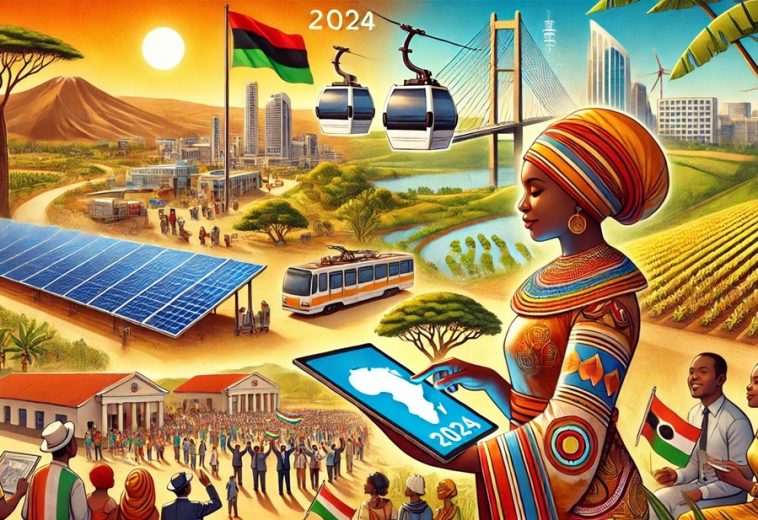Africa is rewriting its leadership narrative, with an increasing number of women taking up influential roles across the continent. This shift is not just about numbers; it reflects the impact of the transformations these women are making on governance, policy, and societal change. Historically underrepresented in political and economic decision-making, African women have become symbols of resilience, vision, and change.
According to a recent report on Women in Parliament, the global proportion of women in voting chambers has risen to 26.9 percent, driven by elections and appointments in the past year. This growth mirrors the increase in 2022 but was slower than the 0.6 percent rise seen in both 2021 and 2020.
READ ALSO: African Women in Leadership Inspiring Change in Global Institutions
Rwanda continues to lead globally, with women holding 61.3 percent of seats in the Chamber of Deputies, followed by Cuba and Nicaragua at 55.7 percent and 53.9 percent, respectively.
At the beginning of 2024, the share of women in parliaments across sub-Saharan Africa was 27.3%, marking a 0.8% increase compared to the previous year, positioning the region as the third highest globally.
In 2023, data from the United Nations revealed that 18 chambers in 13 sub-Saharan African countries held elections. On average, 19.1% of those elected were women, reflecting a 3.9% increase from previous elections. This was the largest recorded increase worldwide.
Overall, women’s representation improved in 11 chambers, with some of the biggest gains recorded in Eswatini (upper chamber), Benin, and Sierra Leone. However, in four chambers, women’s representation remained the same (or changed by 1% or less), while the share of women MPs declined in three chambers: Guinea-Bissau, Liberia (lower chamber), and Nigeria (upper chamber).
Across the 13 countries with elections in 2023, the highest shares of women elected to parliament were recorded in the upper chambers of Zimbabwe (45%) and Eswatini (43.3%). By contrast, Nigeria elected the least gender-representative parliament in the region, with women making up just 2.8% of MPs in the upper chamber and 3.9% in the lower chamber.
African Women Who Shaped Leadership Across the Continent
Women in Africa have historically played significant roles in governance, though often in informal capacities or behind the scenes. Figures such as Queen Nzinga of Ndongo and Matamba, and the legendary Yaa Asantewaa of the Ashanti Empire are examples of African women who led their people through periods of crisis. However, colonial legacies and entrenched patriarchal systems sidelined women from leadership roles for decades.
Here are some of the most influential women who have shaped African leadership:
Ellen Johnson Sirleaf
Ellen Johnson Sirleaf, Africa’s first female president, led Liberia from 2006 to 2018. Her presidency symbolised hope for a nation recovering from civil war. Sirleaf focused on rebuilding infrastructure, promoting education, and advocating for women’s rights. Her 2011 Nobel Peace Prize recognised her efforts to advance peace and gender equity, inspiring countless women across the continent.
Ngozi Okonjo-Iweala
Ngozi Okonjo-Iweala’s appointment as the first African and first female Director-General of the World Trade Organisation (WTO) how African women are breaking global barriers. As Nigeria’s finance minister, Okonjo-Iweala spearheaded economic reforms and tackled corruption. Her leadership in global institutions highlight the vital role African women play in shaping international economic policies.
Joyce Banda:
In 2012, Joyce Banda became Malawi’s first female president, demonstrating the crucial role women can play in governance. Banda implemented significant economic reforms and championed gender equality. Her initiatives to empower women economically and educationally showcased her belief in the transformative power of women-led development.
Sahle-Work Zewde
Appointed in 2018, Sahle-Work Zewde became Ethiopia’s first female president. A symbol of peace and inclusivity, Zewde advocates for gender parity and diplomacy. Her leadership reflects a growing recognition of women’s contributions to fostering unity and sustainable development in Africa.
Changing Policies
Several African nations have implemented progressive policies to promote women’s participation in leadership. Rwanda leads the world with over 60% female representation in parliament. South Africa and Senegal have also made strides by introducing gender quotas to ensure balanced representation. These policies are not symbolic; they are reshaping the political landscape and driving more inclusive governance.
The Ripple Effect: Women Driving Societal Change
Women in power are not just political leaders but also change-makers. Their leadership often brings critical issues such as maternal health, education, and gender-based violence to the forefront of policy discussions. For example, Ngozi Okonjo-Iweala’s focus on transparency has inspired reforms in various sectors, while Ellen Johnson Sirleaf’s leadership has been pivotal in promoting women’s involvement in peacebuilding efforts.
Breaking Chains, Building Bridges
The rise of women leaders in Africa represents the breaking of historical chains of inequality and the building of bridges toward a more equitable future. These leaders are paving the way for the next generation, demonstrating that leadership is not defined by gender but by vision and capability.
The Road to Full Parity: The Role of Civil Society and Media
While progress has been significant, challenges remain. Cultural norms, limited access to education, and systemic biases continue to hinder women’s participation in leadership. Advocacy groups and civil society organisations are working tirelessly to address these barriers. However, achieving full parity requires sustained efforts and societal shifts.
Organisations like the African Women Leaders Network (AWLN) and media outlets, including African Leadership Magazine, have been instrumental in amplifying the voices of women leaders. By showcasing their achievements and advocating for policy changes, these platforms play a crucial role in sustaining momentum toward gender equality.
The growing representation of women in leadership across Africa is not just a victory for gender equality; it is a testament to the continent’s commitment to inclusivity and progress. As these women continue to inspire and lead, they are transforming governance and societal structures, proving that the future of African leadership is bright, diverse, and inclusive.




